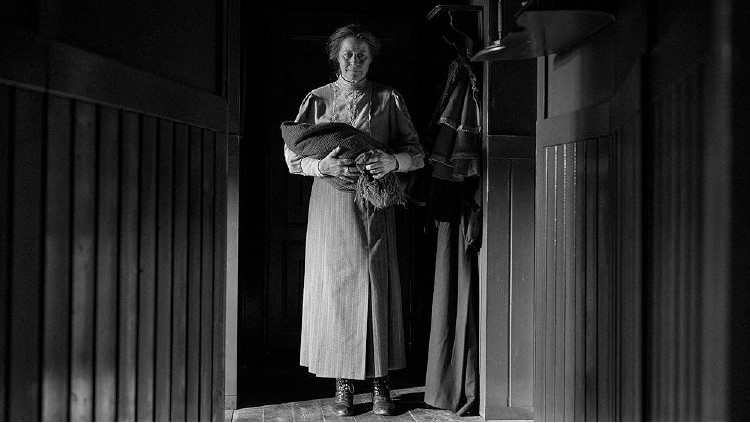The Girl with the Needle

In 1919 Copenhagen as the Great War comes to a close, Karoline (Vic Carmen Sonne, "Godland"), who hasn't heard from her husband Peter (Besir Zeciri) in a year, is struggling to make ends meet sewing uniforms at a family factory. When she is evicted from her room, she appeals to her boss, Jørgen (Joachim Fjelstrup), for widow's benefits. Moved by her predicament and beauty, Jørgen is lured into an affair and promise of marriage when Karoline becomes pregnant, but when his mother, the Baroness (Benedikte Hansen), not only puts a stop to that but fires her, Karoline will become "The Girl with the Needle."
Laura's Review: A-
Cowriter (with Line Langebek Knudsen)/director Magnus von Horn's latest film is about as different from his last, 2020's "Sweat," a modern fable warning about the quest for social media fame, as could be imagined. This time around, von Horn has given us a period piece about a cruel society's unwanted, strikingly photographed in black & white by cinematography by Michal Dymek ("EO") in a boxy 3:2 aspect ratio.
The film begins with an eerie, Lynchian image, that of a face morphing into others which we will meet along the way. The film overall is indebted to Lynch as well, recalling "The Elephant Man" in look, sound and theme, disfigurement featured in a freak show. And like "The Elephant Man," "The Girl with the Needle" is based on true events.
After being gifted with a new dress and told she is beautiful by Jørgen, Karoline asks if he will marry her. He agrees and she lines up factory friend Frida (Tessa Hoder) to be in charge of all the servants she'll have in Jørgen's estate. On top of the world in spite of living in a dark room with no running water and a bucket for a bathroom, she'll hear a man call her name from across the street as she leaves the factory one day. It is Peter, so facially disfigured from the war he covers the lower part of his face with a tin mask. After bringing him to a different home than the one he left, and listening to him slurp some food, Karoline informs him she's met someone else, that she's pregnant and screams at him to leave.
Her own circumstances quickly spiraling after her tangle with the Baroness, Karoline attempts to self abort in a public bath. Bleeding profusely, she's noticed by an older woman, Dagmar (Trine Dyrholm, "The Celebration," "Love Is All You Need"), who helps her to back to her room and tells her to have the child then come to her - for a fee, Dagmar will place Karoline's baby in a good home. And that is just what the young woman does, but with no place to turn and no money, Karoline also asks for work, offering to breastfeed babies before they are placed. Instead she's asked to feed Erena (Ava Knox Martin), Dagmar's six year-old daughter. But Karoline also begins to regret giving away her child and when she abandons her post in Dagmar's candy store to follow the woman, who's refused to tell her where the latest babe is going, she makes a very disturbing discovery.
In addition to the wartime and post-war babies which are not wanted, we not only see Karoline rejected multiple times, but Peter, whose disfigurement lands him in a circus freak show (Karoline will return to him and be taken in with open arms, only to abandon him again once she's regained her footing). Turn of the century Danish society is presented as a dog eat dog world, where kindness can be a cover for cowardice (Jørgen) or profit (Dagmar) and where a child born with a cleft palate is doomed. Dagmar self medicates, suffering from an undisclosed ailment, and turns away her younger lover Svendsen (Ari Alexander) when he begins to take more of an interest in Karoline. Even young Erena isn't immune from grasping for favored status, Karoline horrified to find the young girl trying to suffocate the little boy who's taken her place in Karoline's care.
It is difficult to empathize with Karoline, who Sonne portrays initially as coldly manipulative, a woman operating on survival instinct alone, but as Karoline begins to recognize the plights of others, Sonne gradually allows compassion to permeate her performance. She'll form a tight bond with Dagmar, Dyrholm maintaining sympathy even after her crimes are revealed. And in the last scene, an unexpected moment of grace, as another cast aside by circumstance is saved.
The film's period detail is exquisite, production designer Jagna Dobesz ("Sweat") working with Dymek on location in Denmark and Poland to create a world of twisty narrow streets and bleak buildings housing the masses juxtaposed with the iron gates securing the estates of the wealthy. It's a dark, fairy tale world full of fairy tale faces like the old woman (Anna Tulestedt) who becomes Karoline's landlady. Frederikke Hoffmeier completes the mood with an unconventional score of low, droning moans and metallic vibrations. "The Girl with the Needle" sets a terrible tale in desperate surroundings, allowing one beam of light to illuminate its closing moments.
Robin's Review: B
Mubi releases "The Girl with the Needle" in select theaters on 12/6/24.

